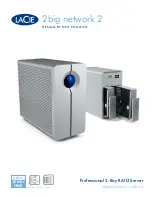
3
A natural consequence of the striping process is that each physical drive in a given logical drive
contains the same amount of data. If one physical drive has a larger capacity than other physical
drives in the same logical drive, the extra capacity is wasted because it cannot be used by the
logical drive.
RAID arrays
As shown in
, a group of physical drives containing the logical drive is called a RAID array
(or array, denoted by A
n
). Since all the physical drives in an array are commonly configured into just
one logical drive, the term logical drive is often used to refer to an array. However, an array can
contain several logical drives, each of a different size.
Each logical drive in an array is distributed across all of the physical drives within the array. A logical
drive can also extend across more than one port on the same controller, but it cannot extend across
more than one controller.
Figure 4 RAID arrays
Drive failure, although rare, can be catastrophic. For arrays that are configured as shown in
, failure of any physical drive in the array causes every logical drive in the array to suffer
irretrievable data loss. To avoid data loss due to physical drive failure, logical drives are configured
with fault tolerance. For more information, see “
For any configuration except RAID 0, further protection against data loss can be achieved by
assigning a drive as an online spare (or hot spare). This drive contains no data and is connected to
the same controller as the array. When any other physical drive in the array fails, the controller
automatically rebuilds information that was originally on the failed drive to the online spare. The
system is thus restored to full RAID-level data protection, although it now no longer has an online
spare. (However, in the unlikely event that another drive in the array fails while data is being
rewritten to the online spare, the logical drive will still fail.)
When you configure an online spare, it is automatically assigned to all logical drives in the same
array. If several arrays are all on one controller, you do not need to assign a separate online spare
to each array. Instead, you can configure one hard drive to be the online spare for the arrays.
Summary of Contents for UniServer B5700 G3
Page 35: ...19 Figure 29 Selecting the RAID volume to be deleted...
Page 116: ...56 Figure 96 Controller Configuration screen...
Page 220: ...61 Figure 109 Selecting Main Menu 2 Select Controller Management and press Enter...
Page 243: ...84 Figure 153 Confirming the operation...
Page 293: ...50 Figure 89 Clearing completion...
Page 382: ...21 Figure 27 Storage controller information...
Page 389: ...7 Figure 8 Identifying a storage controller 2...










































